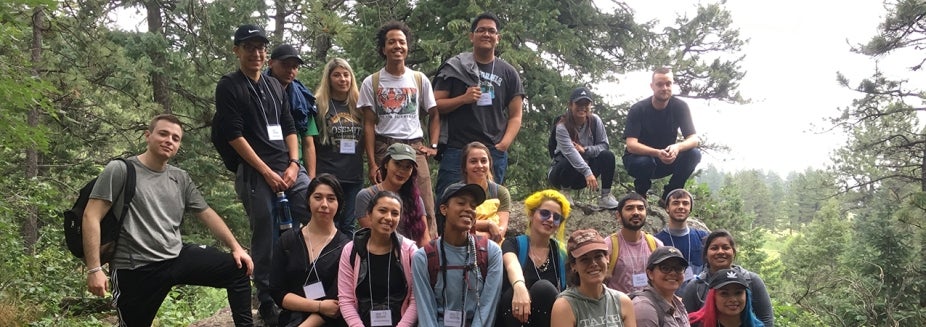Creating an Inclusive Application

Index of Topics
-
CHECK WITH YOUR INSTITUTION
-
SET DEADLINES FOR THE APPLICATION AND ACCEPTANCE FOR YOUR REU PROGRAM
-
SELECT TOOLS FOR HANDLING APPLICATIONS, TRANSCRIPTS, AND LETTERS
-
GIVE CLEAR APPLICATION INSTRUCTIONS ON YOUR REU WEBSITE
-
CREATE A SIMPLE YET EFFECTIVE APPLICATION FORM
-
USE ESSAY QUESTIONS EFFECTIVELY

Creating an Inclusive REU Application
Your REU application process holds the key to identifying students with motivation and strong potential, and it tells the students about your program. You want to make sure your application is clear and not intimidating. This is especially important if you are interested in attracting students from historically underrepresented groups, or nontraditional and community college students, who might not have gone through the application process before and who find the process intimidating. Here are some steps and tips on creating a successful process (click to jump to topic).
CHECK WITH YOUR INSTITUTION
Before you design your application process, check with your department or HR if there are procedures that you need to follow. Know that most REUs pay students with a stipend and don’t formally hire them.
SET DEADLINES FOR THE APPLICATION AND ACCEPTANCE FOR YOUR REU PROGRAM
- Post your application information online by December, if possible.
- Choose an application deadline that corresponds with other programs, e.g. early February.
- REU sites can make offers to students prior to March 15th. The NSF Geosciences Directorate requires that students have until March 15th to decide whether to accept an offer. Make it clear to the student that a decision is not required until the 15th of March.
SELECT TOOLS FOR HANDLING APPLICATIONS, TRANSCRIPTS, AND LETTERS
Choose the mechanism for students to submit applications. Possible tools for hosting online applications include:
- Your department’s website or your institution. Some have systems that allow online application forms and uploading of transcripts, and will send references reminders to submit their recommendations on time.
- Survey Monkey (free, or about $230/year to be able to download data in spreadsheets)
GIVE CLEAR APPLICATION INSTRUCTIONS ON YOUR REU WEBSITE
- State the application deadline (e.g. Feb. 10).
- Describe eligibility requirements for the REU: e.g. U.S. citizens or permanent residents; must be currently enrolled in college, etc.
- If your program is funded to reach a specific group or groups, describe the groups and state that they are “encouraged to apply.”
- Provide the website/email addresses where applicants will:
- Upload or email electronic transcripts
- Have references to submit letters of recommendation
- Fill out their application form
- Provide a downloadable PDF of the application form, as faculty sometimes print out forms for students without internet access. Include a mailing address where they can send it.
- Accessibility: Be sure that your promotional materials and application form are accessible to individuals with physical or sensory disabilities (for example, those with visual impairments). For support, contact the International Association for Geoscience Diversity at http://www.theiagd.org or at info_at_theiagd.org.
- Provide a contact phone/email address for questions about the application. This will help to make your program feel more welcoming and accessible.
CREATE A SIMPLE YET EFFECTIVE APPLICATION FORM
Application sections could include:
- Personal information (name, email, phone, address, etc.)
- Education information (year in college, college name, major, courses)
- Research interests (can be a checklist of topics or open answer – this helps with matching students to projects)
- Skills background (computer, lab, field or other skills)
- Honors or scholarships
- Previous work experience
- Service or education work (tutoring, teaching, outreach, etc.)
- Transcripts: Request unofficial electronic transcripts, as they are easier and cheaper for students to send and for you to catalog electronically. Students accepted into the program can be asked to provide official transcripts if necessary.
- Many REU applications include questions about race, ethnicity, and disabilities, which is useful data to have. For examples, look at REU websites at the NSF Search for an REU Site page. These questions are often permitted when interns are paid through stipends, but not generally allowed when students are hired as employees. Check with your organization about what is allowed.
- Essays: An essay can provide a window into the student’s thinking, previous opportunities, and motivation. In some cases, though, a student with tremendous potential may write too little. If possible, do a word count and ask the applicant to submit more information. Letters of recommendation can provide additional insight into the student’s actual potential.
USE ESSAY QUESTIONS EFFECTIVELY

Essays can be the key to finding students who fit your program, and can be the most important part of the application. Consider including guidance on the answer length, e.g. “Please write at least 200 words, and no more than 400 words.” Here are examples below.
- Describe the areas of research in the geosciences that interest you most, your personal goals for the internship, and indicate your preference for working in office, lab, or field settings.
- Write about what your career goals are and how participating in this REU program will help you meet these goals.
- What unique qualities and characteristics will you bring to our program?
- This REU program is dedicated to enhancing the diversity of future scientific communities and sharing our science with a broader audience. Please describe how you, based on your personal background and life experiences (including social, cultural, familial, educational, or other opportunities or challenges) will contribute to this mission during and after participation in this REU.
Make sure your application is clear and not intimidating, especially if you are interested in attracting students from historically underrepresented groups, or nontraditional and community college students, who may not have gone through the application process before and who find the process intimidating.
For more help with this, please contact Valerie Sloan.